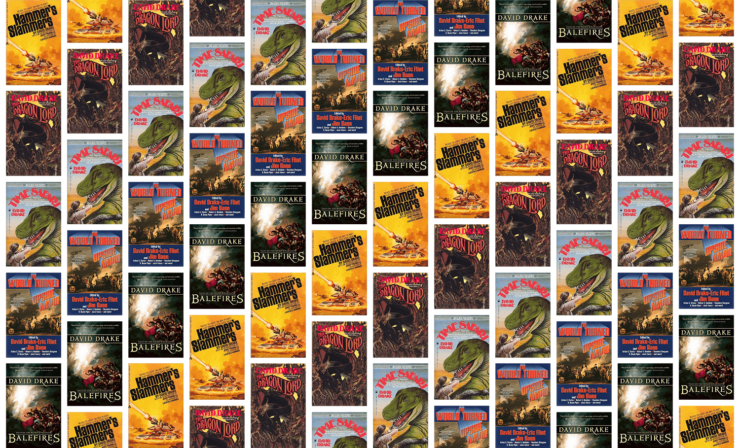Author David Drake passed away December 10, 2023. Memories of Drake appeared to be universally positive, and he didn’t seem to have had enemies. This is not always the case with speculative fiction authors (an understatement), particularly ones whose careers were as long as Drake’s.
Science fiction being the immense field that it is, there are readers who have never tried a Drake story, whose first knowledge of David Drake was reading his obituary. Some of them may be considering reading Drake’s books. Drake was prolific so where to start?
Here are five suggestions, drawn from across the genres in which Drake worked.
Military SF: Hammer’s Slammers (1979)
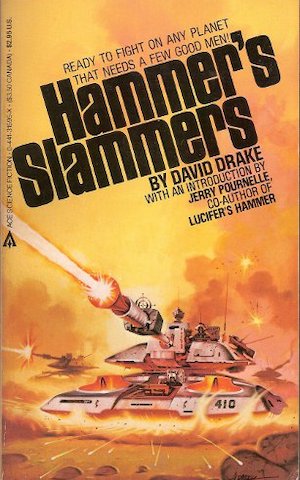
Drake was one of a handful of pioneers in what later became known as military science fiction. For many readers, the stories collected in this Disco Era collection were their first exposure to Drake in particular and to MilSF in general. Therefore, it is only logical to begin with Slammers.
Friesland’s Secretary Tromp has a simple dream: use Friesland’s thriving economy to compensate for Friesland’s dismal martial skills. Attract the galaxy’s best mercenaries with offers of Friesland citizenship and residency, have the mercs accomplish the military goals Friesland cannot, then massacre the mercs once they’ve served their purpose. Friesland will have achieved its goals without having to worry about the destabilizing effect of free companies on the galactic balance of power.
The flaw in Tromp’s plan is Alois Hammer, the officer charged with recruiting what became known as Hammer’s Slammers. Among Hammer’s virtues: loyalty to the men and women who accepted his offer of employment. Alerted by Tromp himself to the fate being prepared for the Slammers, Hammer orders his unit to obliterate the Friesland forces. That accomplished, the Slammers then help forge a golden age of mercenary warfare, an era that is anything but golden from everyone else’s perspective.
Drake being a Vietnam War veteran, it’s not surprising to see Vietnam-War-era disaffection spurring a story about civilian disregard for soldiers. There is also a healthy dose of Machiavelli’s reservations about mercenaries. What isn’t there is any glorification of war: combat will transform people but rarely in positive ways.
Horror: Balefires (2007)
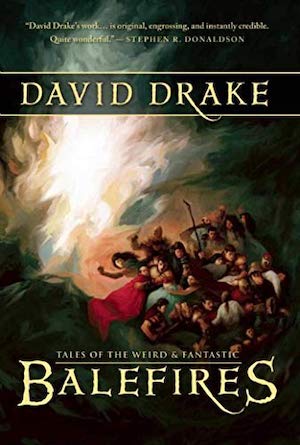
Before he helped pioneer MilSF, Drake was a horror writer. His very first published story was “Denkirch,” first published in August Derleth’s 1967 horror anthology Travellers by Night. One could very easily imagine a timeline in which Drake is known for his horror works, not his science fiction and fantasy.
Although long uncollected, “Denkirch” may be found along with many other early Drake stories in Balefires. With a single exception (2004’s The Elf House), the stories included in this collection highlight Drake’s early career, when he was a prolific weird-fantasy and horror short story author.
While the stories themselves are good enough to warrant reading, this collection is of particular note to long-time Drake fans as well as those new to him. The tales are accompanied by abundant commentary, written by Drake himself.
Fantasy: The Dragon Lord (1979)
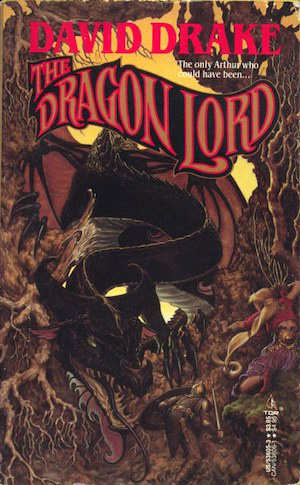
Drake also wrote more conventional fantasy stories, tales that had he begun being published half a century later might have been deemed “grimdark.” The horror in this collection does not come from the stories’ supernatural elements, but rather from the characters themselves.
In The Dragon Lord, for example, Drake imagines a King Arthur whose ambition to unify post-Roman Britain is unbridled by burdensome qualities like mercy or practicality. Saxon refusal to bend the knee to Arthur convinces the warlord that his mistake is insufficient escalation. Surely, a dragon will solve Arthur’s problems. While the great Merlin can provide Arthur with his dragon, first the mage needs certain components neither Merlin nor Arthur’s companions can supply. However, Irish warrior Mael can… provided Arthur seizes the right hostage to motivate Mael sufficiently.
Drake was widely read in classic fantasy and science fiction. It may not be entirely coincidental that there are parallels between Mael and his companion Starkad and Leiber’s Fafhrd and the Gray Mouser.
Time Travel: Time Safari (1982)
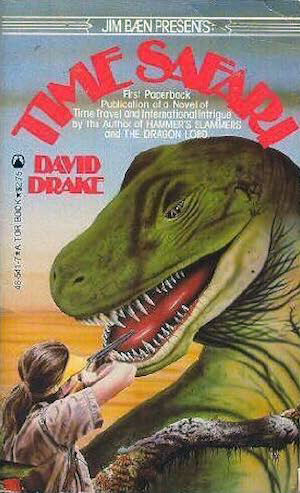
Ever since Wells sent his time traveler into the distant future, SF authors have embraced the story potential of time travel. Drake was no exception. Drake wrote enough time travel stories to fill a not-too-short bookshelf, at both novel and short lengths.
Time Safari collects three of Drake’s Henry Vickers stories. While time travel is too imprecise to facilitate forays into recent history, it serves for Vicker’s purposes, which are to convey rich idiots into the past, where the would-be game hunters can do for the dinosaurs what humans did for the megafauna of the Holocene. Or, alternatively, die trying.
This collection follows in the footsteps of de Camp’s Rivers and Aiyar. However, the Vickers’ stories take more cynical view of the gentlemanly sport of drastically curtailing megafaunal biodiversity.
Anthology: The World Turned Upside Down (2005)
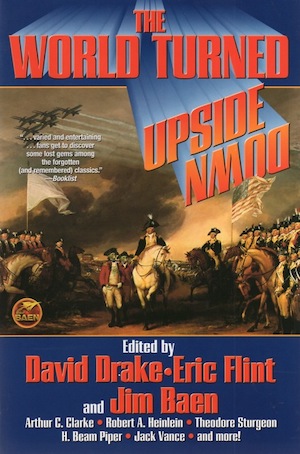
Like many figures in the speculative fiction world, Drake wore hats other than that of author over the course of his career. Indeed, Drake, along with Karl Edward Wagner and James Groce, won a special World Fantasy Award for their joint publishing concern, Carcosa House.
Drake co-edited a number of anthologies, the most memorable of which is The World Turned Upside Down (2005). Co-edited with Jim Baen and Eric Flint, this anthology is a seven-hundred-page-plus tribute to the classic stories that got the trio hooked on science fiction. The contents range from the well-known author authors like Heinlein and Leiber to less well-known figures like Guin and Geier. The World Turned Upside Down is both a worthy introduction to classic SF, as well as to the three men who edited it.
***
Drake was prolific and had a long career. Therefore, five works is a very small sample of a large body of work. Drake fans, please feel free to suggest in comments which Drake works readers new to Drake should consider.
In the words of fanfiction author Musty181, four-time Hugo finalist, prolific book reviewer, and perennial Darwin Award nominee James Davis Nicoll “looks like a default mii with glasses.” His work has appeared in Interzone, Publishers Weekly and Romantic Times as well as on his own websites, James Nicoll Reviews (where he is assisted by editor Karen Lofstrom and web person Adrienne L. Travis) and the 2021, 2022, and 2023 Aurora Award finalist Young People Read Old SFF (where he is assisted by web person Adrienne L. Travis). His Patreon can be found here.










